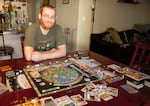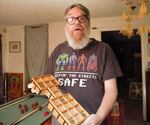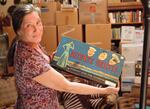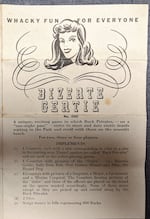
Avid gamer Bryan Fosmire sits at his dining room table in September 2022. He had to revert to playing board games at home after Oregon's Interactive Museum of Gaming and Puzzlery was closed by the COVID-19 pandemic in 2020.
Kristian Foden-Vencil / OPB
Bryan Fosmire used to be a regular at Oregon’s Interactive Museum of Gaming and Puzzlery. Today the 28-year-old mechanical engineer plays games like “Terraforming Mars” at his dining room table in Dundee. But the museum gave him a different, richer place to indulge his love of games.
“The first thing you’d probably notice going is the giant wall, full of shelves of games, at the back,” he said.
When it was open between 2010 and 2020, the Washington County museum had a collection of about 9,000 games. Its mission was to educate people and make the games accessible.
“They actually did have exhibits around the room as well. Even going back so far as ancient games like where the first dice came from and how they would use bones before that,” Fosmire said.

Shelves of games from the Interactive Museum of Gaming and Puzzlery before it closed in 2020.
Kyle Engen
The museum included a small store and a little café. For Fosmire, it was a place to meet like-minded people.
“You’d go in, and if there were people there you could meet them and see if they wanted to play something,” he said. “If not, you could just bring your own group, pull something off the shelf and just play it.”
But the museum had to close as part of the statewide pandemic shutdown.
“We’ve got just the kind of material that can transfer an infection,” said co-founder Kyle Engen. “Handling games and passing dice around and passing pieces around. So we had to close.”
Now the museum’s collection sits in boxes, packed in multiple storage lockers and homes across Washington County.

Museum co-founder Kyle Engen's Washington County home is packed with games from the collection. He's looking for new leadership and a new location for the museum.
Kristian Foden-Vencil / OPB
Engen and co-founder Carol Mathewson want to bring the museum back. But they’re having trouble.
“I reached out to three or four universities around here, to the anthropology departments,” Engen said. “I called, I sent emails. Never a response at all.”
The married couple opened the original Museum of Gaming in Beaverton back in 2010, after Engen couldn’t find work and they decided to try and make a living off something they love.
He’d collected games all his life. His childhood had been spent playing fantasy games in Eugene with people like Richard Garfield, the inventor of the popular card game Magic: The Gathering.
For a few years, the museum earned enough to keep the doors open, even though it had to move a couple of times as landlords looked for higher rents.

Museum co-founder Carol Mathewson displays a copy of Bizerte Gertie, a 1943 game where the object is not to end up dating "Alice the Hound Dog."
Kristian Foden-Vencil / OPB
But now Engen and Mathewson’s house is packed with boxes of old games: 50 versions of Monopoly, puzzles, mahjong, bingo and rare games — like Bizerte Gertie from 1943.
“Games anthropologically have everything to do with how we learn,” Mathewson said.
Bizerte Gertie, for example, was created for World War II soldiers. The goal was to go to a club, date a beautiful woman and take her for a walk along the beach. There’s a coquettish damsel on the box and three leering military men. But in a sign of those times, the object of the game was to avoid ending up with what the game’s instructions refer to as: “Alice the Hound Dog.”

One of the objects of 1943 Milton Bradley game Bizerte Gertie was for players not to end up with "Alice the Hound Dog."
Kristian Foden-Vencil / OPB
Engen and Mathewson have spent years collecting such games in thrift stores, often spending 75 cents here or a few dollars there. They believe games illustrate the eras in which they were created, like a 1969 game created by the magazine Psychology Today.
“It was called Blacks &Whites, and you could not win the game if you were a black character. Period. That was the point of the game,” Mathewson said. “These things are metaphors that follow us through every era of history.”
Engen said their collection addresses that history. Take, for example, playing cards. It’s not clear how they were invented, but one theory is that they started as IOUs, traded around by Chinese soldiers during the seventh century.
“Because they were so far away from the central government, they couldn’t pay the army. So they wrote scripts saying, ‘We owe you 10 dollars.’ on pieces of paper. Then the men started gambling with those and playing cards were invented,” Engen said.
Mathewson said this kind of history and context doesn’t get passed around in a shop. For that, games need their own museum.
“What we want is a venue to impart all this really groovy stuff that we learned by doing the research,” Mathewson said.
But after a decade of trying to keep the museum running, and a pandemic, they’re weary.
“I’m no longer willing to do whatever it takes to keep it going for 60 hours a week,” said Engen. “I’m tired of that now.”

Kyle Engen and Carol Mathewson's home is packed full of games from the collection.
Kristian Foden-Vencil / OPB
In addition to new leadership, the museum also needs a new location. Organizers have tried seeking help from local businesses and government agencies. They keep being told to just open a store, where people can buy new games and see the collection at the same time. But there are already plenty of gaming stores and coffee shops in the Portland region, and even at least one gaming restaurant, the Mox Boarding House.
Mike Williams, the economic development manager at the city of Beaverton said city leaders might be able to help — but first they need information.
“How much space do they need? What can they afford? How do they want to use the space?” he said. “And after we know those things. We can help them find a location. In this case, we also thought: ‘Hey, a little bit of specialized technical assistance would be helpful as well.’”
Mathewson said they have lots of people interested in setting up a museum, but they need a benefactor, “We need someone with nice deep pockets because that’s what the symphony has or the art museum,” she said.
There was hope that some of Engen’s old games might provide the money to reopen. Collectors’ cards can be worth $100,000 or more. But over the years, some of the collection’s most valuable cards have disappeared as people played with them and cataloged the collection.

Interactive Museum of Gaming and Puzzlery before it closed in 2020.
Kyle Engen
